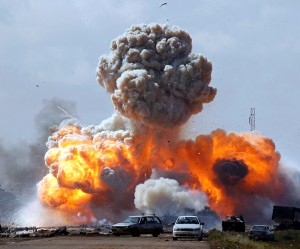Tripoli, 14 May:
The North Atlantic Treaty Organisation (NATO) has been accused of failing to acknowledge several dozen civilian deaths accidentally caused . . .[restrict]by its airstrikes during last year’s campaign in Libya.
The allegations are contained in a new report by Human Rights Watch, which examined in detail eight NATO air strikes in Libya that it says resulted in 72 civilian deaths, including 20 women and 24 children.

“NATO took important steps to minimise civilian casualties during the Libya campaign, but information and investigations are needed to explain why 72 civilians died,” said Fred Abrahams, special adviser at Human Rights Watch and principal author of the report. “Attacks are allowed only on military targets, and serious questions remain in some incidents about what exactly NATO forces were striking.”
It is believed that over the course of the eight-month conflict, at least 30,000 Libyans were killed in fighting between revolutionaries and forces loyal to the Qaddafi regime.
Most informed observers agree that in that context, the number of accidental civilian deaths caused by NATO airstrikes was very low. Whilst concurring with that assessment, Human Rights Watch argued that an investigation into possible civilian deaths caused by NATO strikes was nonetheless required.
“The overall care NATO took in the campaign is undermined by its refusal to examine the dozens of civilian deaths,” Abrahams said. “This is needed to provide compensation for victims of wrongful attacks, and to learn from mistakes and minimise civilian casualties in future wars.”
NATO began operations over Libya last March, on a mandate provided by UN Security Council Resolution 1973 to protect Libyan civilians.
NATO has said in the past that it only struck “legitimate military tagets selected consistently with the UN mandate, and that great care was taken in each case to minimise risk to civilians”.
The organisation added that hundreds of targets were rejected, and some strikes were aborted to avoid civilian casualties, whilst noting that the Qaddafi regime had often used civilian facilities to conduct military activities.
Responding to this latest report, however, NATO has said that it cannot validate the claims, as it does not have a mandate to operate on the ground in Libya. A spokeswoman added that NATO would conduct an investigation if invited into the country to do so by the Libyan authorities.
Human Rights Watch has argued that NATO should make the first move, by promptly submitting a request to the transitional government in Libya to begin an investigation. [/restrict]







